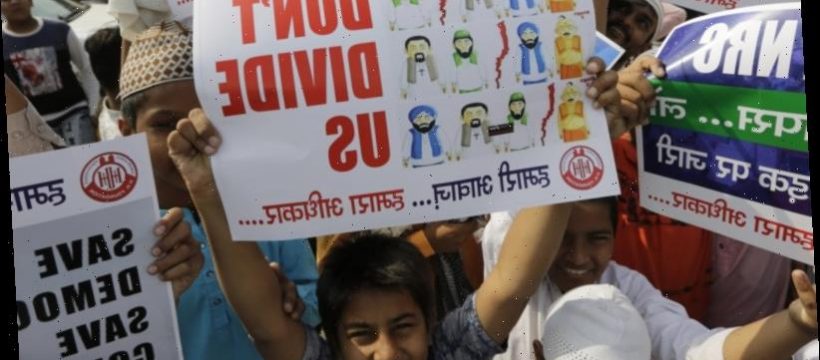Delhi: India's controversial religion-based citizenship act will have to pass the scrutiny of the nation's top court, even as Prime Minister Narendra Modi's government pledged to push ahead and implement the law.
Indian students of India’s Jamia Millia Islamia University prepare banners during a protest against the law.Credit:AP
A three-judge bench headed by Chief Justice SA Bobde issued a notice to the government seeking its response. The court agreed to examine the legality of the legislation following more than 50 petitions filed by activists, lawyers, student groups, Muslim bodies, and politicians from across the country. The court will next hear the case on January 22 and may decide in January if the law should be stayed, Bobde said.
The move may calm protesters who have called the law discriminatory because it bars undocumented Muslims from Pakistan, Afghanistan and Bangladesh from seeking citizenship but allows Hindus, Sikhs, Buddhists, Jains, Parsis and Christians who migrated from these regions to do so. On Tuesday, Home Minister Amit Shah, who shepherded the Citizenship Amendment Act through the Parliament last week, defended it and ruled out any possibility of repealing the law.
"When the country was divided on the basis of religion and the minorities are being persecuted there in the name of religion, then will you not give them your citizenship?" Shah said in comments broadcast on Times Now, referring to the partition of India in 1947.
The new law is seen as a precursor to Shah's plan to implement a nationwide citizens' register to weed out illegal migrants.
Demonstrations first began in the eastern state of Assam where there are fears the new law would allow an influx of migrants from neighbouring Bangladesh. Some 1.9 million people in Assam — many of them Muslims – risk losing their Indian citizenship after the state enforced the citizens register locally in August.
Anger soon spread across many parts of India, including the capital New Delhi, over fears it would damage India's traditional secular ethos enshrined in its Constitution that treats all religions on par.
Protesters remain firm on their demand for a repeal of the act, said Shifa Ur Rehman Khan, president of Jamia university's alumni association. Yet, the government has shown no signs of backing down on the bill. On Tuesday, Shah said no Indian citizen of any faith need worry about the citizenship rules.
The government is now turning its attention to building a temple for the Hindu warrior god Ram on the site of a demolished mosque in northern India, after the country's top court gave a verdict in the favour of Hindu groups last month.
Bloomberg
Source: Read Full Article

